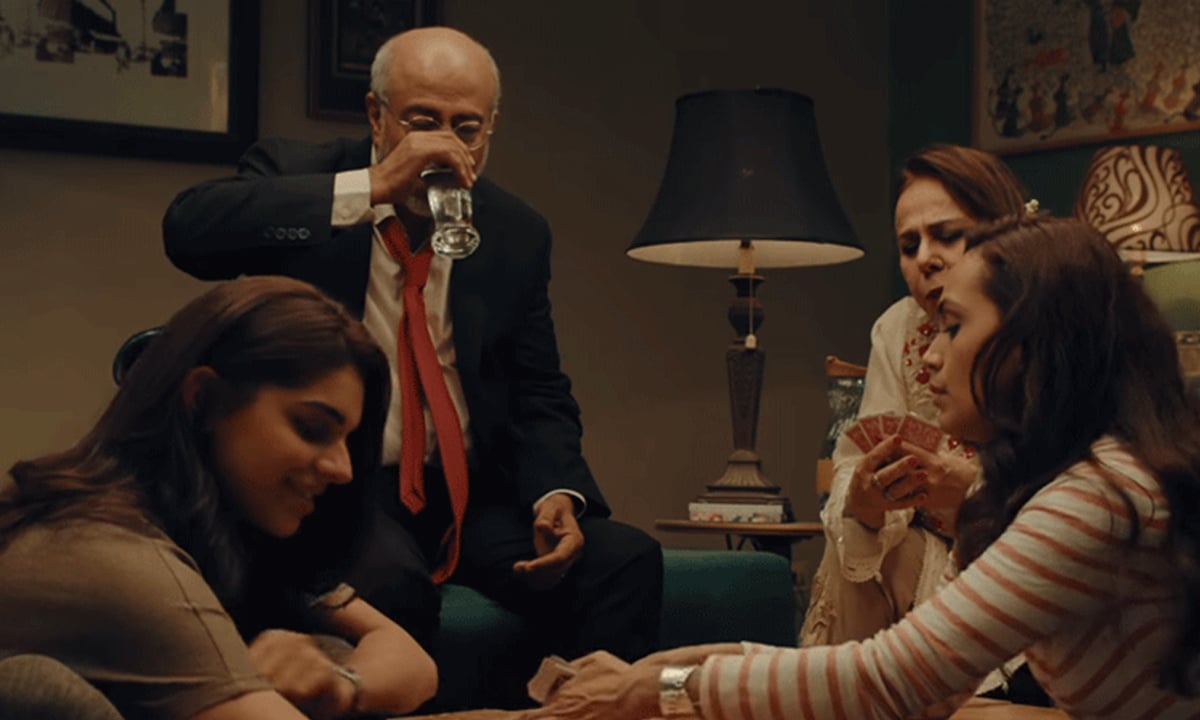
On the surface, Asim Abbasi’s directorial debut appears to be a story of love and family. Delve a little deeper and it reveals itself to be about time – the way it binds us and divides us – and a narrative about memory and its secrets, how it is subjective and easily manipulated, never the same for any two people. The film opens with idyllic images of childhood. We see Zareen (Aamina Sheikh), Zara (Sanam Saeed) and Zain (Faris Khalid) playing in the family home on their lands in interior Sindh. They do not seem to have a care in the world, content with whiling away their time in each other’s company. As the film jumps to the present, things are less ideal. We see Zareen single-handedly managing the household and caring for her ailing parents (Mohammad Ahmed and Beo Raana Zafar). She oversees electrical repairs in the family’s Karachi home, makes sure her parents are taking their medicine on time and travels to the farm to supervise the harvest.
When her father, Siraj, is hospitalised due to heart disease, we are introduced to her siblings. Zara is aloof, living in London for the past 10 years, having left Karachi after a car accident in which she had seriously injured a young boy near their home in Sindh. Zain lives in New York with his wife and son and his role in the family is limited to the occasional Facetime call. The story moves quickly in the beginning — the characters are unveiled abruptly, thrown into the turmoil of their father’s illness. Zara returns to Karachi, driven by a sense of obligation and guilt. Zain remains a distant spectator, checking up on the others through his Facetime calls, offering to come home but, ultimately, choosing to stay away.
As the narrative progresses, things are left unsaid among the characters. There is tension between Zara and her father, but we do not know why; Siraj’s nurse, Romeo (Adnan Malik), seems to have a strangely awkward bond with Zareen that is rooted in the past but we do not know where it comes from; and while Romeo has only now been employed to care of Siraj, he is already integral to the family but we don’t know why.
The narrative soon begins to meander. We are often left wondering where the story is going and it feels like we are unnecessarily treated to scenarios that repeatedly display the personality quirks of various characters.
The story is given very little breathing space. Conflict presents itself at the very beginning and the audience is not given a chance to get to know the characters outside of it.
The film’s cinematography seems to compliment this narrative of half-revealed truths. Shots inside the family home are half-lit and framed in shadows; the characters’ present actions unfold in pools of light but there is a sense of details hidden just beneath the surface.

Zareen seems to be defined by her bitter resentment of being abandoned by her siblings to care for their parents and the family home. Zara is struggling to come to terms with her past and the circumstances of her departure from Pakistan. Romeo is defined largely by his devotion to the family and his admiration of Zareen — an unfortunately one-dimensional perspective on someone who is supposed to be a main character in the story. Despite this, Malik does justice to the character, giving Romeo’s stiff awkwardness a sense of mystery so that we know there is more to him than his relationship with the family.
Aamina, similarly, manages to bring Zareen’s anger to life with a commanding performance. The audience is caught between sympathising with her for the sacrifices she has made and being weary of her self-righteousness and bitterness. Sanam’s performance seems lukewarm at times but she manages to more than redeem herself at the film’s climax, when she is confronted by her past — her grief and confusion are palpable and powerful. Beo steals the show in the role of Habiba, the mother. She lights up the screen with her presence and makes her character’s over-the-top personality believable and lovable.
Cake manages to elicit an emotional response from the audience without falling into the trap of being overtly sappy or sentimental. The script uses humour to give us breaks between moments of drama and, while it seems forced and unnecessary in a few instances, it is largely effective in making us laugh. The dialogue is free-flowing and natural and the family’s banter comes across as real and unembellished. Even in climactic moments, it is the little details – characters talking over each other, leaving sentences unfinished – that make the dialogue believable and natural.

Conceptually, Cake is convoluted and could easily do away with some of its plot threads. While the writer is to be commended for trying to make a point about interfaith relationships with Muslim Zareen and Christian Romeo, the point is lost and overshadowed by other elements in the narrative. Zara’s separation from her husband back in England does not add to the film.
The movie would have fared better had it focused more on Zara’s relationship with her ex-boyfriend Shehryar (Mikaal Zulfiqar), which is a driving point for the narrative but is only superficially explored. Zain’s relationship with his wife and his life in New York is, similarly, imperative to his conflict with his family but remains in the background and, as a consequence, we are not given a chance to properly acquaint ourselves with his struggles.
It is clear that Abbasi has a strong command over film-making. His is a mature artistic treatment of a narrative that only falls short at times. Aesthetically and technically, the film leaves little to be desired — except perhaps for the overuse of orange and blue lighting tones during dramatic moments. We are treated to a visually delightful movie that leaves us with a reminder of the fragility of human memory and the delicate nature of time.
The writer is a staffer at the Herald.
This was originally published in the April 2018 issue of the Herald. To read more subscribe to the Herald in print.







